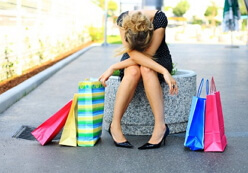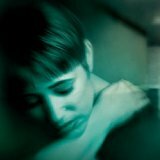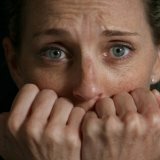Oniomania
 Onyomania( shopogolizm), translated from Greek, means "insane purchases," namely, an obsessive and irresistible attraction to make purchases, while not comparing the need for consequences. At a certain point, shopping becomes both entertainment and relaxation, when a person relaxes, giving this process a special meaning. This obsession with shopping is called shoppingism or shopaholism. People who are subject to this mania are referred to as shopaholics.
Onyomania( shopogolizm), translated from Greek, means "insane purchases," namely, an obsessive and irresistible attraction to make purchases, while not comparing the need for consequences. At a certain point, shopping becomes both entertainment and relaxation, when a person relaxes, giving this process a special meaning. This obsession with shopping is called shoppingism or shopaholism. People who are subject to this mania are referred to as shopaholics.
Onyomania is as serious a dependency as alcoholism, as well as drug addiction. There is evidence that up to 20% of people in developed countries are affected by store dependency.
The term "oniomania" was first used in Europe. He was offered by the German psychiatrist Emil Krepelin, who worked on this psychological illness together with a psychiatrist from Switzerland Eigen Bleuler.
At present, the problem of oniomania takes a lot of attention from the media. Countries with a high economic level of development are affected by this disease. So, for example, according to 2008, about 800 thousand Germans are dependent on shopping. The United States at first did not consider them a disorder of health, but after a while they revised their attitude towards shopaholism.
Oniomania( Shopaholism) - symptoms and signs
The main sign of shopaholism is a shopping trip without the clear purpose of acquiring a particular purchase. While visiting shopping centers, shopaholics inspect a large number of exhibited goods, are fond of fashion magazines, are tempted to buy a thing without urgent need, stay in constant discussion of the purchased goods, experience apathy and oppression without visiting trading establishments.
Oniomania( shopogolizm) - causes of
Doctors put forward the following reasons for the development of shop dependency: psychological problems from childhood, lack of attention from loved ones, feelings of loneliness and abandonment, the need for recognition and love, depressive states( depression), namely, depression after parting or depressionAfter a divorce, a lowered level of self-regulation, a thirst for constant adrenaline, an illusion of power( as things are bought with good things, helpful attitude of sellers, flattering praise, and also firm packsEet for purchases), the desire for a surrogate of happiness, the lack of a hormone serotonin, the monotony of life, disappointment in children, in the family, in partners, the influence of advertising information, sexual dissatisfaction. Shopping gives the illusion of freedom, as well as false control over their lives.
Oniomania helps the shopaholic to cope with depression and anxiety, raises personal self-esteem and confidence. Shopaholic feels happy already from what can afford to buy yourself not what you need, but what instantly wanted. At that moment he feels himself truly free.
The consequences of the onomania are expressed in a senseless waste of money for unnecessary things and a sad regret about it, however, after a while, shopaholic artists return to their favorite pastime.
Onyomania often destroys families, as well as their financial well-being, because of the debts of a shopaholic. Sometimes for the sake of satisfying their mania they commit antisocial actions. If it is impossible to immediately satisfy the onyomania, the shoppingoman is exposed to the withdrawal syndrome. An important problem of onyomania is the initiation of diseases: vegetative-vascular dystonia, depression, psychosomatic diseases, arterial hypertension, neurosis, kleptomania, sleep disorders, aggression, autoaggression, depression, stress state, decreased immune resistance, loss of self-esteem.
Oniomania( Shopaholism) - treatment of
How to get rid of shopaholism? It is necessary to take control of expenses to one of the family members of a shopaholic, if he himself can not cope with this;You can not lose sight of relatives for a long time patient and, without delaying, seek help from psychologists on this issue. There are societies of anonymous shopaholics who provide mutual assistance on the issue of oniomania. But most importantly shokogolikam themselves learn to control themselves and their expenses. Before you go shopping, you need to think through your purchases and thus avoid spontaneous acquisitions. In the store itself, do not attack the first thing that comes to your eyes, but you should compare a few different models to start. In the event of a rush, anything else to buy in addition to the purchased one, hold yourself and do not let the subconscious mind take up your desires. Take for a rule that a discount is not yet an excuse to make rash purchases. If during the sale period things are very accessible for you, then before buying, think about whether they will be necessary for you in the future. There is a possibility that you will not use them in the same way. At first, after the announcement of the sale of the new collection, do not rush to buy things. Over time, prices will be reduced, and you can buy a thing at a reduced price.
Give up credit cards, because this habit guarantees you an increase in debts( cash to a shopaholic allows you to control the waste of money).When leaving the house, take a small amount of money, which will allow you to save your fortune. Make a list of your spending, and keep your checks. So you will appreciate the real picture of your embezzlement. At a time when you can not control yourself and your embezzlement, do not go shopping, and before buying, consider its feasibility and need for you.
How to effectively treat shopologism? To neutralize the onyomania, the following methods are used: self-isolation from advertising, planning of financial expenses only for essentials, at the time of seizures mastering the methods of neutralizing signs of onyomania, short-term use of antidepressants( citalopram).Shop dependency takes on a keen interest in shopaholics during the financial crisis, which contributes to the formation of chronic stress. Especially prone to a sense of surrogate happiness of a woman who, due to a lack of positive emotions and go shopping. But how to learn to keep the line between pleasure and dependence? A new thing for a woman acts as a means of reassurance, so spending money gives you the opportunity to receive the necessary emotions. Subsequently, she will experience a sense of guilt, will be angry for unnecessary waste, which again leads to depression. Low self-esteem of women pushes to buy new things, which makes them lucky in their own eyes. Grief, loneliness, boredom, disappointment all this pushes women to waste.
test for shopologism Check yourself if you have a wild desire to make rash purchases:
- you have a desire so strong that you lose control over your behavior;
- in the store you lose the ability to choose, and you buy everything until the money runs out;
- notice the meaninglessness of purchases;
- the desire to make a purchase arises from irritation, loneliness and dissatisfaction;
- the need to buy something acts as the only way to get distracted;
- nervously break in the store and make purchases;
- you lose most of the time and money for nothing, but life goes by;
- the passion for shopping negatively affects your family life, as well as your career.
If three of the above criteria are found, consultation with experts on the prevention of onyomania is necessary. If you have half of these signs, then you yourself can not be cured. When more than five signs are detected, the onyomania formed.
How to get rid of shopaholism?
Some tips can help to cope with the desire to stay away from obsessive attraction to skimp:
- be aware of your problem;
- in advance, choose an alternative to shopping trips( gymnastics, shower, massage, sauna, self-massage, music, dancing);
- interestingly plan your leisure: communication with people, walks, theaters, games with children, exhibitions, reading books.
More articles on the topic:
• Thanatophobia • No-phobia



